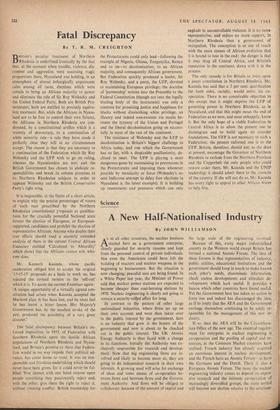Fatal Discrepancy
By T. R. M. CREIGHTON DRITAIN'S peculiar treatment of Northern Rhodesia is underlined ironically by the fact that, at the moment when trouble, violence, dis- content and aggression were assuming tragic proportions there, Nyasaland was holding, in an atmosphere of almost lethargically acquiescent calm among all races, elections which were certain to bring an African majority to power and eliminate the rule of Sir Roy Welensky and the United Federal Party. Both are British Pro- tectorates; both are entitled to precisely equiva- lent treatment. But, while the Africans in Nyasa- land are to be free to control their own futures, the Africans in Northern Rhodesia are con- demned, by a constitutional artifice which is a travesty of democracy, to a continuation of white minority rule—a rule they have made it perfectly clear they will in no circumstances accept. The reason is that they are necessary to a continuation of the Federation which Sir Roy Welensky and the UFP wish to go on ruling, whereas the Nyasalanders are not; and the British Government has chosen to abdicate re- sponsibilities and break its solemn promises to its Northern Rhodesian subjects in order to appease Welensky and the British Conservative Party's right wing.
It is impossible, in the limits of a short article, to explain why the precise percentages of voters of each race prescribed by the Northern Rhodesian constitutional croposals as qualifica- tions for the crucially powerful National seats favour the election of European, or European- supported, candidates and prohibit the election of representative Africans. Anyone who doubts their true effects should read a masterly extended analysis of them in the current Central African Examiner entitled 'Calculated to Absurdity' which shows that the Africans cannot win, who- ever does.
Mr. Kenneth Kaunda, whose pacific moderation obliged him to accept the original '15-15-15' proposals as a basis to work on, has rejected the revised version as the 'sell-out' which it is. To quote the current Examiner again: 'A unique opportunity of a virtually agreed con- stitution had arisen when Kaunda accepted the Macleod plan. It has been lost, and he must feel he has learnt a bitter lesson. Her Majesty's Government has, by the smallest stroke of the pen, produced the possibility of a very great disaster.'
The fatal discrepancy between Britain's en- forced imposition, in 1953, of Federation with Southern Rhodesia upon the hostile African populations of Northern Rhodesia and Nyasa- land, and Britain's promise to them that Federa- tion would in no way impede their political ad- vance, has come home to roost. It was an irre- sponsible and frivolous undertaking which should never have been given, for it could never be ful- filled. You cannot with one hand impose upon people something they passionately reject and, with the other, give them the right to reject it, without creating conflict. British trusteeship for the Protectorates could only lead—following the example of Nigeria, Ghana, Tanganyika, Kenya and so on—to decolonisation; to an African majority, and consequently African government. But Federation quickly produced a leader, Sir Roy Welensky, and a party, the UFP, devoted to maintaining European privilege; the doctrine of 'partnership' written into the Preamble to the Federal Constitution (though not into the legally binding body of the instrument) was only a nostrum for promising justice and happiness for blacks without diminishing white privilege, an illusory and indeed non-existent via media be- tween the tyranny of the Union and Portugal and the liberal decolonisation going on success- fully in most of the rest of the continent.
The resistance of Welensky and the UFP to decolonisation is Britain's biggest challenge in Africa today, and one which the Government has so far, with a despicable pusillanimity, de- clined to meet. The UFP is playing a most dangerous game by maintaining its pretensions in the Protectorates and imposing them whenever possible by mendacity or force (Welensky's re- cent ludicrous attempt to delay free elections in Nyasaland is the latest example). It is building up resentments and pressures which can only explode in uncontrollable violence. It is no more representative, and enjoys no more support, in Northern Rhodesia than a government of occupation. The conception is so out of touch with the main stream of African evolution that it is bound to lose in the end: the danger is that it may drag all Central Africa, and Britain's reputation in the continent, down with it in the process.
The only remedy is for Britain to insist upon a juster, constitution in Northern Rhodesia. Mr. Kaunda has said that a 5 per cent, qualification for both sides, racially, would enlist his co- operation. There is no conceivable objection to this except that it might deprive the UFP of governing power in Northern Rhodesia, as in Nyasaland, and that this might mean the end of Federation as we now, and most unhappily, know it. But the only hope of a viable Federation in Central Africa is to allow the present one to disintegrate and to build again on sounder foundations. The UFP is not necessary to such a Federation; the present enforced one is to the UFP. Britain, therefore, should not, as she does at present, encourage the Governor of Northern Rhodesia to exclude from the Northern Province and the Copperbelt the only people who could restore order there, Mr. Kaunda and the UNIP leadership; it should admit them to the councils of the country. If she will not do so, Mr. Kaunda has every right to appeal to other African States to help him.






























 Previous page
Previous page